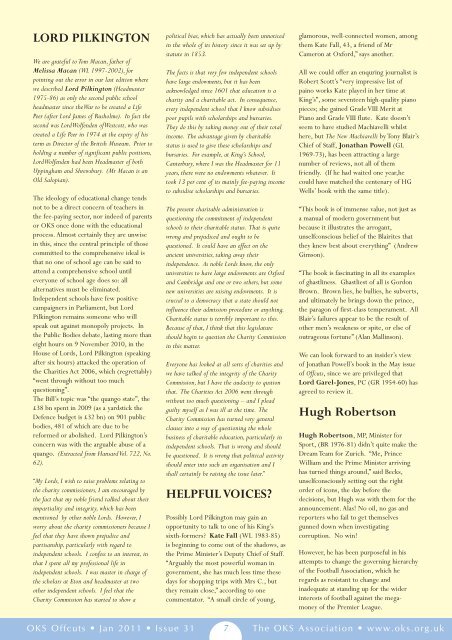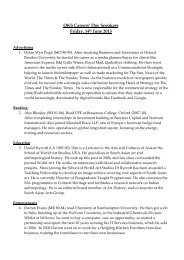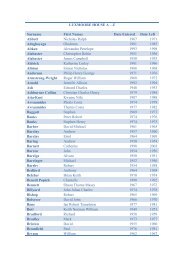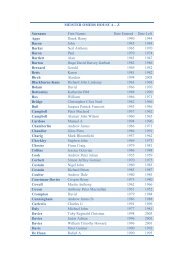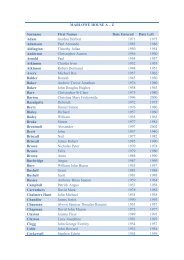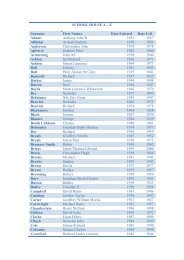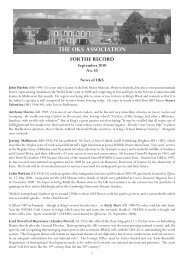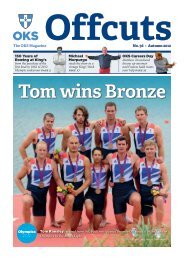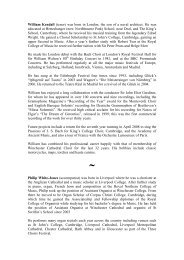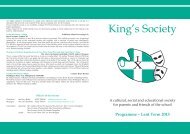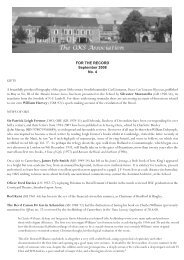January 2011 offcuts_Jan Offcuts 2010.qxd.qxd - The OKS Association
January 2011 offcuts_Jan Offcuts 2010.qxd.qxd - The OKS Association
January 2011 offcuts_Jan Offcuts 2010.qxd.qxd - The OKS Association
You also want an ePaper? Increase the reach of your titles
YUMPU automatically turns print PDFs into web optimized ePapers that Google loves.
LORD PILKINGTON<br />
We are grateful to Tom Macan, father of<br />
Melissa Macan (WL 1997-2002), for<br />
pointing out the error in our last edition where<br />
we described Lord Pilkington (Headmaster<br />
1975-86) as only the second public school<br />
headmaster since the War to be created a Life<br />
Peer (after Lord James of Rusholme). In fact the<br />
second was Lord Wolfenden of Westcott, who was<br />
created a Life Peer in 1974 at the expiry of his<br />
term as Director of the British Museum. Prior to<br />
holding a number of significant public positions,<br />
Lord Wolfenden had been Headmaster of both<br />
Uppingham and Shrewsbury. (Mr Macan is an<br />
Old Salopian).<br />
<strong>The</strong> ideology of educational change tends<br />
not to be a direct concern of teachers in<br />
the fee-paying sector, nor indeed of parents<br />
or <strong>OKS</strong> once done with the educational<br />
process. Almost certainly they are unwise<br />
in this, since the central principle of those<br />
committed to the comprehensive ideal is<br />
that no one of school age can be said to<br />
attend a comprehensive school until<br />
everyone of school age does so: all<br />
alternatives must be eliminated.<br />
Independent schools have few positive<br />
campaigners in Parliament, but Lord<br />
Pilkington remains someone who will<br />
speak out against monopoly projects. In<br />
the Public Bodies debate, lasting more than<br />
eight hours on 9 November 2010, in the<br />
House of Lords, Lord Pilkington (speaking<br />
after six hours) attacked the operation of<br />
the Charities Act 2006, which (regrettably)<br />
“went through without too much<br />
questioning”.<br />
<strong>The</strong> Bill’s topic was “the quango state”, the<br />
£38 bn spent in 2009 (as a yardstick the<br />
Defence budget is £32 bn) on 901 public<br />
bodies, 481 of which are due to be<br />
reformed or abolished. Lord Pilkington’s<br />
concern was with the arguable abuse of a<br />
quango. (Extracted from Hansard Vol. 722, No.<br />
62).<br />
“My Lords, I wish to raise problems relating to<br />
the charity commissioners, I am encouraged by<br />
the fact that my noble friend talked about their<br />
impartiality and integrity, which has been<br />
mentioned by other noble Lords. However, I<br />
worry about the charity commissioners because I<br />
feel that they have shown prejudice and<br />
partisanship, particularly with regard to<br />
independent schools. I confess to an interest, in<br />
that I spent all my professional life in<br />
independent schools. I was master in charge of<br />
the scholars at Eton and headmaster at two<br />
other independent schools. I feel that the<br />
Charity Commission has started to show a<br />
political bias, which has actually been unnoticed<br />
in the whole of its history since it was set up by<br />
statute in 1853.<br />
<strong>The</strong> facts is that very few independent schools<br />
have large endowments, but it has been<br />
acknowledged since 1601 that education is a<br />
charity and a charitable act. In consequence,<br />
every independent school that I know subsidises<br />
poor pupils with scholarships and bursaries.<br />
<strong>The</strong>y do this by taking money out of their total<br />
income. <strong>The</strong> advantage given by charitable<br />
status is used to give these scholarships and<br />
bursaries. For example, at King’s School,<br />
Canterbury, where I was the Headmaster for 11<br />
years, there were no endowments whatever. It<br />
took 13 per cent of its mainly fee-paying income<br />
to subsidise scholarships and bursaries.<br />
<strong>The</strong> present charitable administration is<br />
questioning the commitment of independent<br />
schools to their charitable status. That is quite<br />
wrong and prejudiced and ought to be<br />
questioned. It could have an effect on the<br />
ancient universities, taking away their<br />
independence. As noble Lords know, the only<br />
universities to have large endowments are Oxford<br />
and Cambridge and one or two others, but some<br />
new universities are raising endowments. It is<br />
crucial to a democracy that a state should not<br />
influence their admission procedure or anything.<br />
Charitable status is terribly important to this.<br />
Because of that, I think that this legislature<br />
should begin to question the Charity Commission<br />
in this matter.<br />
Everyone has looked at all sorts of charities and<br />
we have talked of the integrity of the Charity<br />
Commission, but I have the audacity to qustion<br />
that. <strong>The</strong> Charities Act 2006 went through<br />
without too much questioning – and I plead<br />
guilty myself as I was ill at the time. <strong>The</strong><br />
Charity Commission has turned very general<br />
clauses into a way of questioning the whole<br />
business of charitable education, particularly in<br />
independent schools. That is wrong and should<br />
be questioned. It is wrong that political activity<br />
should enter into such an organisation and I<br />
shall certainly be raising the issue later.”<br />
HELPFUL VOICES<br />
Possibly Lord Pilkington may gain an<br />
opportunity to talk to one of his King’s<br />
sixth-formers Kate Fall (WL 1983-85)<br />
is beginning to come out of the shadows, as<br />
the Prime Minister’s Deputy Chief of Staff.<br />
“Arguably the most powerful woman in<br />
government, she has much less time these<br />
days for shopping trips with Mrs C., but<br />
they remain close,” according to one<br />
commentator. “A small circle of young,<br />
glamorous, well-connected women, among<br />
them Kate Fall, 43, a friend of Mr<br />
Cameron at Oxford,” says another.<br />
All we could offer an enquring journalist is<br />
Robert Scott’s “very impressive list of<br />
paino works Kate played in her time at<br />
King’s”, some seventeen high-quality piano<br />
pieces; she gained Grade VIII Merit at<br />
Piano and Grade VIII flute. Kate doesn’t<br />
seem to have studied Machiavelli whilst<br />
here, but <strong>The</strong> New Machiavelli by Tony Blair’s<br />
Chief of Staff, Jonathan Powell (GL<br />
1969-73), has been attracting a large<br />
number of reviews, not all of them<br />
friendly. (If he had waited one year,he<br />
could have matched the centenary of HG<br />
Wells’ book with the same title).<br />
“This book is of immense value, not just as<br />
a manual of modern government but<br />
because it illustrates the arrogant,<br />
unselfconscious belief of the Blairites that<br />
they knew best about everything” (Andrew<br />
Gimson).<br />
“<strong>The</strong> book is fascinating in all its examples<br />
of ghastliness. Ghastliest of all is Gordon<br />
Brown. Brown lies, he bullies, he subverts,<br />
and ultimately he brings down the prince,<br />
the paragon of first-class temperament. All<br />
Blair’s failures appear to be the result of<br />
other men’s weakness or spite, or else of<br />
outrageous fortune” (Alan Mallinson).<br />
We can look forward to an insider’s view<br />
of Jonathan Powell’s book in the May issue<br />
of <strong>Offcuts</strong>, since we are privileged that<br />
Lord Garel-Jones, PC (GR 1954-60) has<br />
agreed to review it.<br />
Hugh Robertson<br />
Hugh Robertson, MP, Minister for<br />
Sport, (BR 1976-81) didn’t quite make the<br />
Dream Team for Zurich. “Me, Prince<br />
William and the Prime Minister arriving<br />
has turned things around,” said Becks,<br />
unselfconsciously setting out the right<br />
order of icons, the day before the<br />
decisions, but Hugh was with them for the<br />
announcement. Alas! No oil, no gas and<br />
reporters who fail to get themselves<br />
gunned down when investigating<br />
corruption. No win!<br />
However, he has been purposeful in his<br />
attempts to change the governing hierarchy<br />
of the Football <strong>Association</strong>, which he<br />
regards as resistant to change and<br />
inadequate at standing up for the wider<br />
interests of football against the megamoney<br />
of the Premier League.<br />
<strong>OKS</strong> <strong>Offcuts</strong> • <strong>Jan</strong> <strong>2011</strong> • Issue 31<br />
7<br />
<strong>The</strong> <strong>OKS</strong> <strong>Association</strong> • www.oks.org.uk


